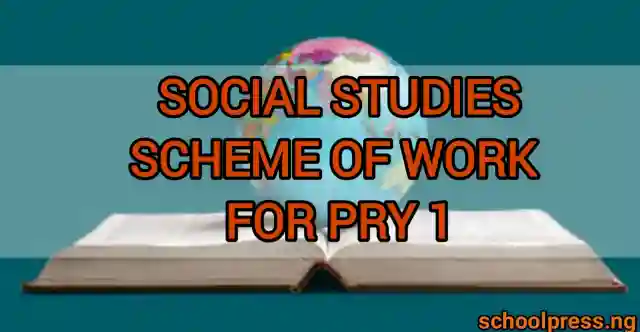Social Studies as a subject focuses on the social life of an individual It also provides insightful knowledge that allows the student to see the world from a broader perspective and know that his or her existence is to contribute to shaping the world.
Moreover, it is aimed at giving the children an understanding of Social Studies more enjoyably and interactively. The Social Studies Scheme of Work for Primary 1 pupils is a period with three terms.
In the first Term, social studies scheme of work for Primary 1, the topic at the beginning covers the following: family, culture, and values where they should understand the different types of families, members of a good family, Culture; meaning and types, Values that show good morals in society, such as kindness, honesty, loyalty, and respect.
The second term of the scheme deals with food and substances. In this term, the pupils learn about why we take substances into the body, the effects of taking substances into the body, and the behaviours and looks of people who consume too much food, drink, or smoke. Other aspects include food, food eaten in the locality, and sources of food in the community.
The third term of the scheme focuses on food safety, risk factors, and water. The pupils will learn about food safety for children, how to make food safe for children, and the risk factors associated with the distribution and preparation of food. Additionally, the pupil learns about sources of water and the use of water in their homes.
The terms under the Social Studies Scheme of Work for Primary 1 pupils have different learning outcomes. This is critical in ensuring that pupils remember the concepts for every term long after leaving the classroom.
The scheme will only be useful if the teachers strive to ensure that the pupils understand and achieve its learning outcomes. Pupils and teachers must work together to realize the learning outcomes.
Teachers must, therefore, take the pupils through the topics. They can do this by telling the pupils stories, role-playing, and showing pupils pictures among many other instruction techniques.
Pupils must be actively involved in class, listening to the teacher, responding to the teacher’s questions, and narrating their experiences.
Table of Contents
Objectives Of Social Studies Scheme of Work for Primary 1
First Term Objectives
Week 1-2: explain the meaning of Social Studies
Week 3- 4: Explain the meaning of family and identify types of family
Week 5 – 6: State the qualities of a good family
Week 8 – 9: Explain the meaning of culture and list types of culture
Week 10: Explain values which show moral e.g. what is right and what is wrong
Second Term Objectives
Week 1-2: Give reasons for taking substances into the body
Week 3-4: Mention the effect of taking substances into the body.
Week 5-6: Demonstrate the looks and behaviours of people who take too much food, drink or smoke, mention the effects of drinking too much, mention the effects of inhaling too much and say what to do to help somebody who is suffering from too much eating, drinking or inhaling
Week 8 – 10: Define food, mention some of the food eaten in their locality and mention the sources of food in the community
Third Term Objectives
Week 1-2: Define food safety
Week 3- 4: Mention ways of ensuring food safety
Week 5- 6: Explain risk factors
Week 8- 9: State risk factors in food, identify risk factors in food distribution and preparation
Week 10: Mention sources of water and enumerate the uses of water in homes
Read More: The Current Official List Of FUNAAB Courses & Programmes
Learning Outcomes of Social Studies Scheme of Work for Primary 1
First-Term Learning Outcomes
Week 1-2: explain the meaning of Social Studies
Week 3- 4: Mention 2 types of families and explain the types of family
Week 5 – 6: Mention 3 qualities of a good family
Week 8 – 9: State the meaning of culture and explain types of culture
Week 10: Explain values which are considered right and wrong
Second Term Learning Outcomes
Week 1-2: Pupils should be able to give meaningful reasons for taking substances into the body
Week 3-4: Mention 4 effects of taking substances into the body
Week 5-6: Mention the effects of drinking too much, mention 3 effects of inhaling too much and demonstrate the behaviours and looks of people who eat, drink and smoke too much.
Read More On Primary 1 Scheme of Work
Basic Science Scheme of Work For Primary 1
Islamic Religious Studies Scheme of Work for Primary 1
Cultural and Creative Arts Scheme of Work for Primary 1
Basic Technology Scheme of Work for Primary 1
Physical Health Education Scheme of Work For Primary 1
Information Technology Scheme of Work For Primary 1
Mathematics scheme of work for Primary 1
History Scheme Of Work for Primary 1
Christian Religious Studies Scheme of Work for Primary 1
Civic Education Scheme of Work for Primary 1
First Term Social Studies Scheme of Work for Primary 1
| WEEK | TOPIC | Contents |
| 1 & 2 | Meaning of Social Studies | Meaning of Social Studies: The Study of man and how his problems are solved in the environment |
| 3 & 4 | The Family | Meaning of a familyTypes of family -The Nuclear family: father, mother and children -Extended family: father, mother, children, grandfather, and grandmother, uncles, aunts, cousins and nephew |
| 5 & 6 | Qualities of a good family | (1) Qualities of a good family: honesty, contentment, interest of others, not greedy, not selfish, discipline, obedience etc. |
| 7 | Mid Term Test | |
| 8 & 9 | Meaning and types of culture | Meaning of culture e.g. people’s ways of life that include dressing, dancing, eating etc.Types of culture e.g. material, nonmaterial |
| 10 | Values that show Good Morals in Our Society | Examples of morals to show what is right i.e. greeting, respect, loyalty, kindness, honesty, contentment, tolerance etc. and what is wrong e.g. stealing, bullying, fighting, lying etc. |
| 11 | Revision | |
| 12&13. | Examination |
Read More: List Of The 53 Accredited Federal Universities in Nigeria- NUC
Second Term Social Studies Scheme of Work for Primary 1
| WEEK | TOPIC | Contents |
| 1 & 2 | Reasons for taking substances into the body | (1) Reasons for taking substances into the body -Stay alone, -hunger, – Thirsty -Enjoyment -Imitation -Curiosity, etc. |
| 3 & 4 | (2) Effects of taking substances into the body e.g. stomach pain, vomiting, stooling, sleeplessness or restlessness, dullness, dizziness, nausea, fainting, death etc. | |
| 5 & 6 | Overdose (too much eating, drinking or smoking) | Causes and observable signs/symptoms of overdose e.g. coughing incessantly, fainting, stooling, etc. Effects of too much eating and drinking -Frequent urinating, bed wetting, intoxication, etc. – Watery eyes, coughing, chocking, fainting, dizziness -Loss of memory etc. How to help people suffering from foods or drug exercise: Once observed, report to parents, teacher or any adult around. |
| 7 | Mid Term Test | |
| 8 & 9 | Food | (1) Meaning of food: Food is anything we eat, drink or take into our body to give us |
| energy and help us grow | ||
| 10 | Food eaten in the locality (bread, eggs, yam, garri, fish, meat etc)Sources of food in the locality/farms, markets, rivers etc. | |
| 11 – 13 | Revision/Examination |
Third Term Social Studies Scheme of Work for Primary 1
| WEEK | TOPIC | CONTENT | |
| 1 & 2 | Food Safety | (1) Meaning of food safety. How to ensure that what we eat, drink or take into our body is not harmful to health | |
| 3 & 4 | Guide to food safety -Reading food labels, -Observe signs of food spoilage and causative organisms; -Washing hands before and after food preparation etc. | ||
| 5 & 6 | Risk factors in food | (1) Meaning of risk factors: | |
| Those factors that drive the occurrence of a hazard. | |||
| 7 | MID – TERM TEST | ||
| 8 | (2) Examples of risk factors in food -Adulteration -Food fraud incidences -Agro-chemical induced death etc. | ||
| Risk factors in food distribution and preparation -Poor storage conditions; -Poor handling; -Poor Hygiene, -Other unknow risks | |||
| 9 & 10 | Sources and Uses of Water | Sources of Water supply in the locality: Stream -SpringRiverTapBore-holeRainfall -well etc. | |
| (1) Meaning of food safety. How to ensure that what we eat, drink or take into our body is not harmful to our health | |||
| 11 | Revision | ||
| 12 | EXAMINATION | ||
Read More: 2024 JAMB Syllabus For Christian Religious Studies & Free Key Points
Teacher’s and Pupils Activities
First Term Teacher’s and Pupil’s Activities
Week 1-2: The teacher should explain and guide the pupils to explain the meaning of Social Studies. The pupils should listen and respond to questions in class on the meaning of
Social Studies
Week 3- 4: The teacher should lead pupils to find out the meaning of the word family and through guided questions explain the types of family. The pupils should find out from home the meaning of “family” and report back to class and listen and respond to questions in class
Week 5 – 6: The teacher should guide the pupils to identify and explain the qualities of a good family. The pupils should participate in role-playing in the family by showing the qualities of a good family e.g. honesty, love, caring etc.
Week 8 – 9: Through guided questions and role-play the teacher should lead the pupils to understand the meaning of the word “Culture” and also lead the pupils to outline types of culture. The pupils should listen and respond to questions in class and participate in the role play, outline and write types of culture
Week 10: The teacher should lead pupils to identify values which show morals in society and attitudes that are wrong. The pupils should demonstrate different types of good and bad values
Second Term Teacher’s and Pupil’s Activities
Week 1-2: The teacher should call on the pupils to demonstrate each of the reasons and dramatize by sharing the reasons for taking substances into the body
Week 3-4: The teacher should use stories to highlight the effects of taking substances into the body, and ask pupils to narrate their experiences of taking substances into the body. The pupils should narrate their own experiences of taking substances into the body
Week 5-6: The teacher should present drawings and paintings of sad faces, and protruding stomachs to emphasize the effects of drinking too much, shows drawing and paintings of sad faces, show pictures of people exhibiting these symptoms or signs, ask pupils to say what they will do to help and summarize their suggestions
The pupils should study the pictures shown by their teacher, narrate their own experiences, copy drawings and paintings, demonstrate the behaviours and looks shown in the picture, suggest what should be done and say what to do to help those who eat, drink and smoke too much
Week 8 – 9: The teacher should ask pupils to bring samples of food items from their homes. The pupils should bring food items from their homes and participate in identifying the food items.
Week 10: The teacher should ask pupils to find out from home the sources of food they eat and ask pupils to paint any of the food items mentioned. The pupils should find out from home sources of food in their locality and paint any of the food items mentioned
Third Term Teacher’s and Pupil’s Activities
Week 1-2: The teacher should lead pupils to define food safety
Week 3- 4: The teacher should ask questions to lead pupils to identify ways of making sure that food is safe. The pupils should participate in mentioning ways of ensuring food safety
Week 5- 6: The teacher should lead pupils to identify and explain risk factors
Week 8- 9: The teacher should present pictures of risk factors in food distribution and preparation and guide pupils to state risk factors in food distribution and preparation
The pupils should participate in class discussion on risk factors associated with food distribution and preparation
Week 10: The teacher should Leads pupils to discuss sources of water supply and Uses Pictures and questions to quick pupils in enumerating the sources of water in homes
The pupils should interpret the pictures, enumerate the sources and uses water supply in homes.
Conclusion
The Social Studies Scheme of Work for Primary 1 pupils is crucial in helping pupils understand the environment around them.
It is a tool for future learning and helps the pupils to have a constructive learning attitude. Teachers should take the initiative to ensure that the learning outcomes for each term’s work are realized. As such, a Social Studies class can be one of the fun and much interactive subjects enjoyed by the pupils.
Read More:A Comprehensive Guide to Check 2024 JAMB Results through Sequential Steps









